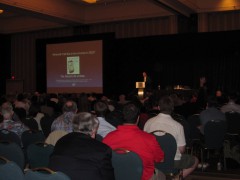“The best way to predict the future is to create it”

–Jim Harris, closing plenary speaker at the World Future 2012
Last week Anneliese Guess attended the World Future Society’s Annual Conference World Future 2012 in Toronto, Canada. The conference included sessions on future trends, ranging from identity to technological progress to demographics to food. The convening of futurists led to many interesting conversations; each expert provided a unique view of the future based on their own expertise and regional perspective.
The opening plenary included presentation by Lee Rainie, Director of the Pew Research Center’s Internet & American Life Project on “The Future of the Internet”. The second speaker was Brian David Johnson, Director of Future Casting and Experience Research at the Intel Corporation on “Waking Up the Algorithm”.
The second night of the conference featured the BetaLaunch, which presented innovative ideas from up-and-coming tech companies. It was billed as an ideas expo and the presenters were the winners of a competition and featured the best competition. Innovators included:
- Tiffany Pressler and her innovative idea for curing jaundice, the Bilisuit (i3 Bioesgins)
- Filabot, a machine that breaks down plastic into filaments that could potentially be used for 3D printer
- Compose the Future, a social network platform that allows users to set goals and discuss the future.
- Cyberhero League, a game which links children, non-profit organizations and socially responsible organizations to educate the next generation of leaders.
- Life Technologies‘ ion-proton sequencer designed to sequence a human genome in 1 days for $1000.
- b-temia’s knee stress relief device, a dermal skeleton to assist people in their daily activities
- ByoLogyc, connecting people through creative media and innovative ideas
This ideas fair served to inform and inspire about the possibilities of the future.
The final speaker was Jim Harris, author of the books Blindsided and The Learning Paradox. He spoke to the rapid change we have seen in technology, healthcare, and industry in the last twnty years. He emphasized that only companies that focus on function and that anticipate customers’ needs before the customers are aware of them will thrive in the future. He also spoke about the general democratization of knowledge that has been brought about by the internet, which will continue to revolutionize fields like healthcare (via self-diagnosis), banking (via mobile banking), and software (vie crowdsourced open software). Harris’ talk really brought the idea home that the “best way to predict the future is to create it” and that we all have a hand in creating a sustainable and productive future.
For more information on the World Future Society, visit their website or search for #wf12 on Twitter.
*All photos in this post were taken by Anneliese Guess on July 27-29, 2012.





